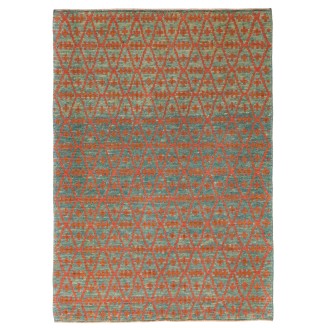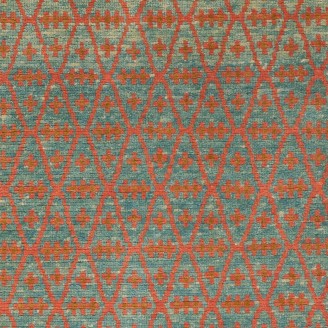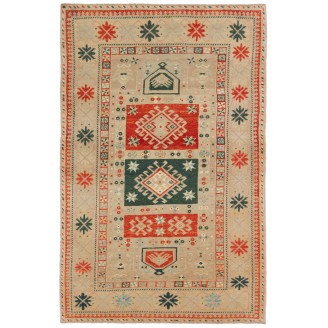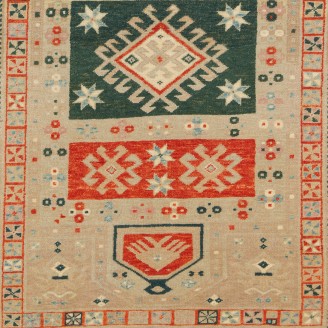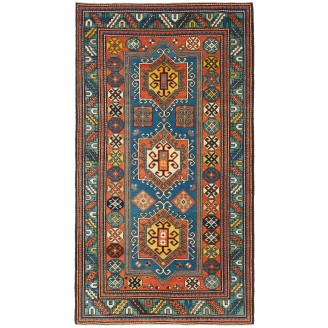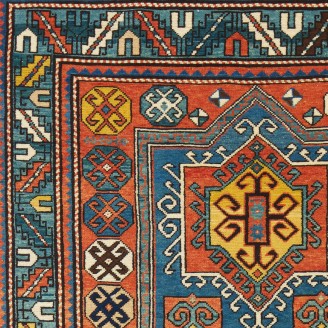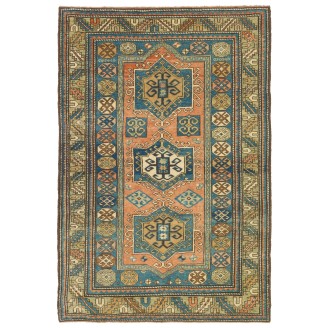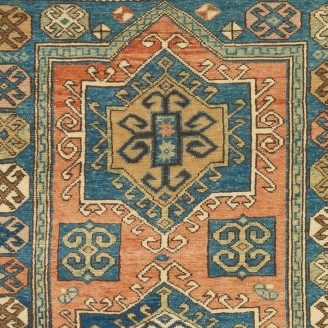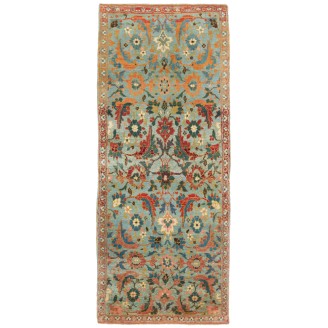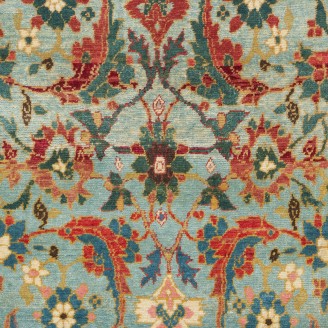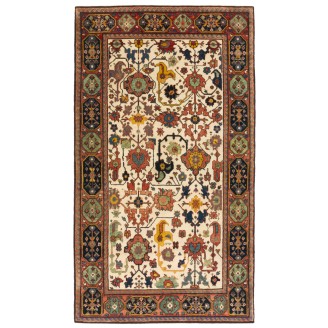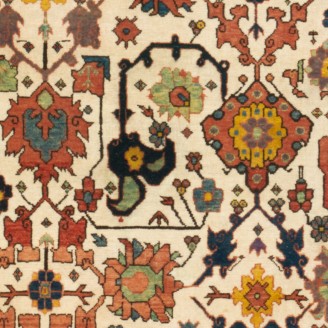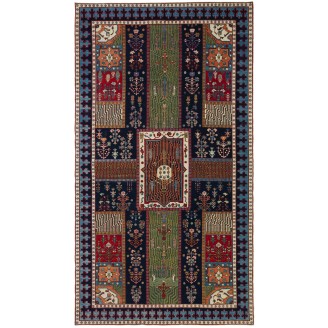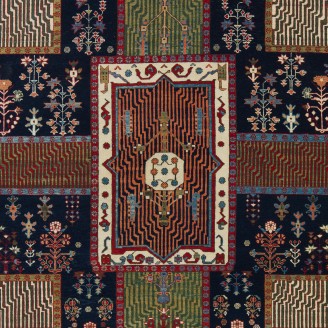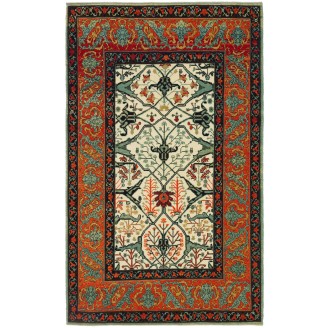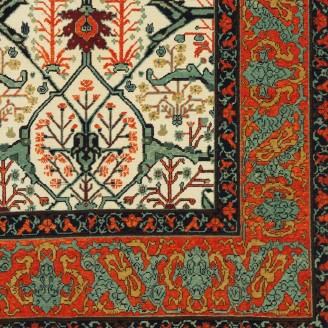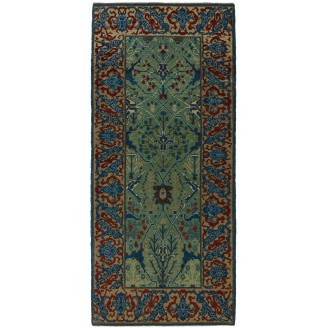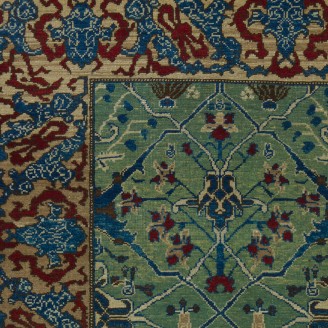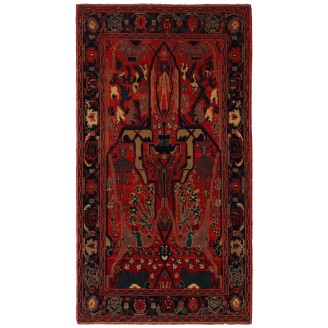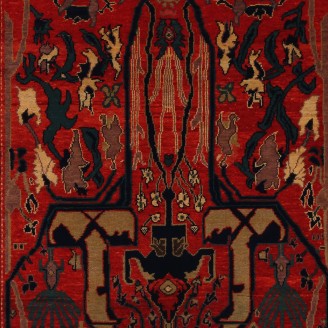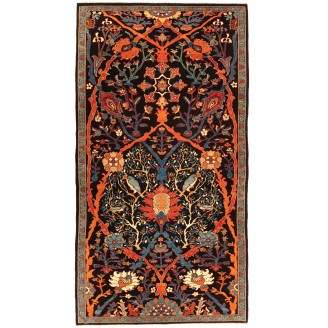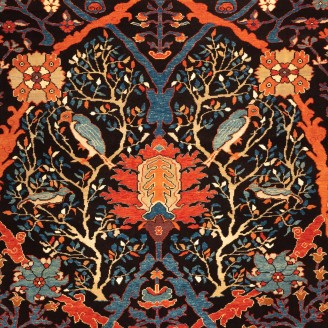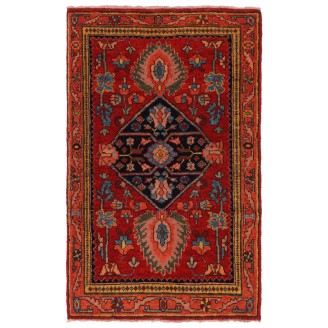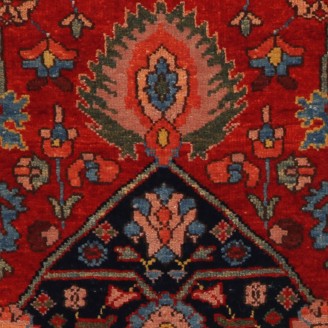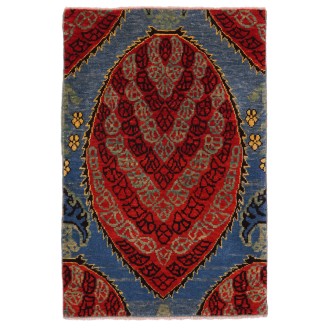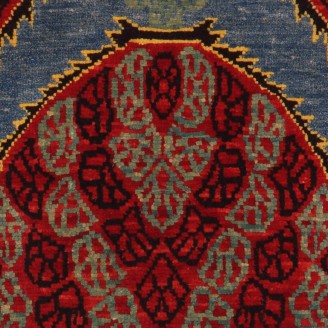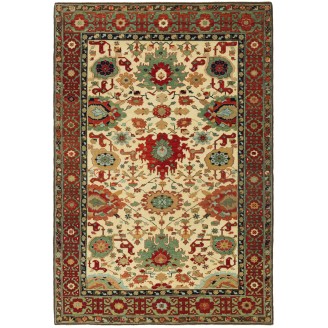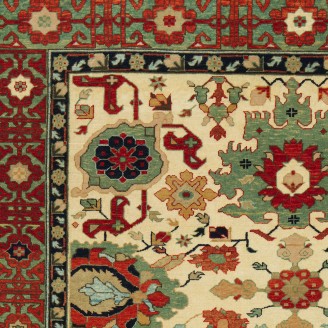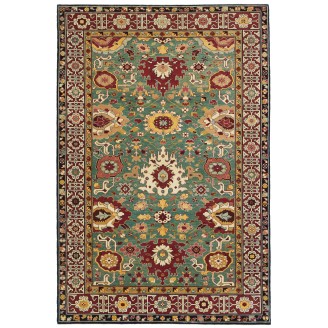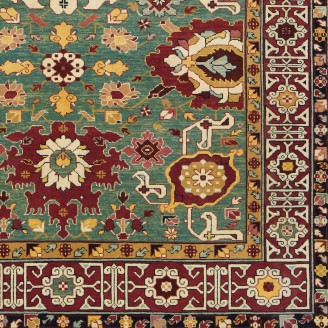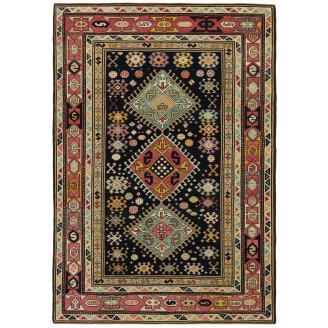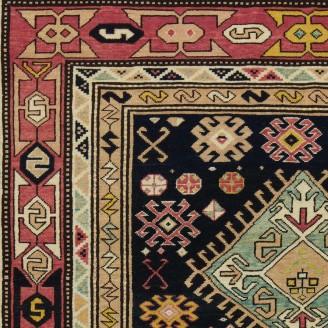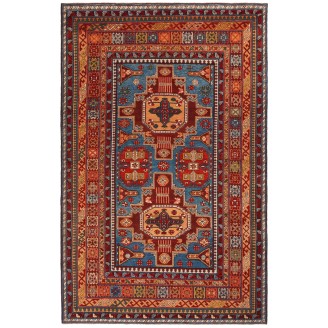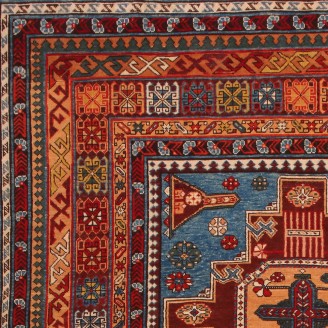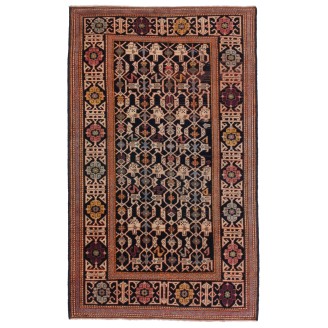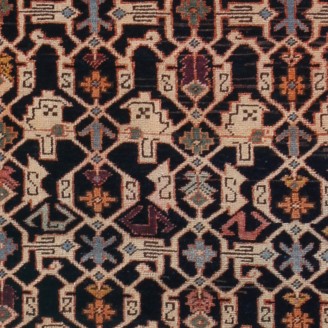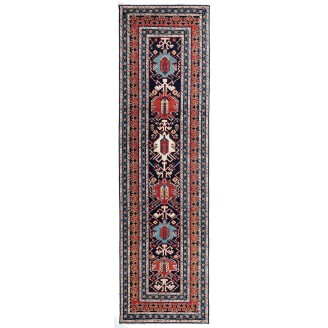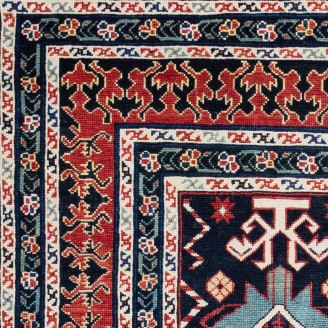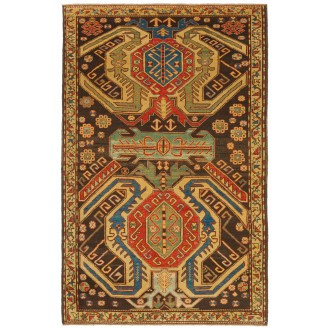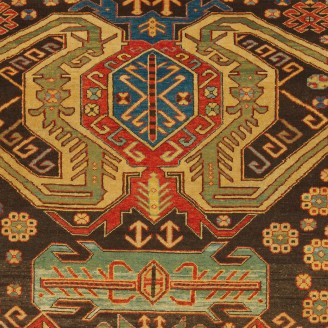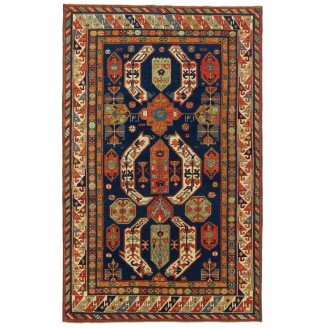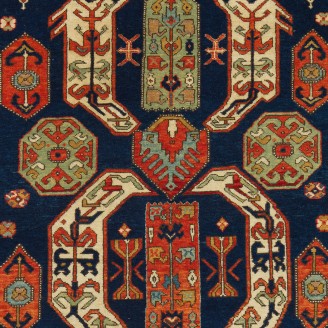Model: ART00257
Dimensions: 1'9" X 2'6"(54cm x 77cm)
This rug's design is composed of diamond and flower rows pattern, filling the field elegantly. These kinds of rugs have often been described as wagirehs or samplers and were said to have been used as weaver`s aids, or for demonstration purposes, made as a template or pattern for the carpet design an..
Price:
$420
Ex Tax:$420
Model: ART00419
Dimensions: 4'6" X 6'11"(138cm x 211cm)
The source of the rug comes from the book Tapis du Caucase - Rugs of the Caucasus, Ian Bennett & Aziz Bassoul, The Nicholas Sursock Museum, Beirut, Lebanon 2003, nr.46. This is a double migrab prayer rug from the late 19th century, Genje ( Gendje ) region, Caucasus area. There are hooked medalli..
Price:
$3,300
Ex Tax:$3,300
Model: ART00364
Dimensions: 4'0" X 7'1"(122cm x 218cm)
This is another Kazak example of the Fachralo is a town north of Lori-Pambak and just southwest of Bordjalou, from the late 19th century, Caucasus area. It has given its name to a number of usually small, boldly designed, and brilliantly colored Kazak rugs but, although this has proved a useful desc..
Price:
$3,100
Ex Tax:$3,100
Model: ART00411
Dimensions: 4'0" X 5'9"(122cm x 177cm)
This is another Kazak example of the Fachralo, a town north of Lori-Pambak and just southwest of Bordjalou, from the late 19th-century, Caucasus area. It has given its name to a number of usually small, boldly designed, and brilliantly colored Kazak rugs but, although this has proved a useful descri..
Price:
$2,500
Ex Tax:$2,500
Model: ART00424
Dimensions: 2'9" X 6'9"(84cm x 208cm)
The source of the rug comes from the book Antique Rugs of Kurdistan A Historical Legacy of Woven Art, James D. Burns, 2002 nr.31. This blue background rug has a variation of masi awita (fish around the lotus) pattern from Senna, Eastern Kurdistan area late 19th century. The field design on this rug ..
Price:
$2,650
Ex Tax:$2,650
Model: ART00234
Dimensions: 4'3" X 7'7"(131cm x 232cm)
The source of the rug comes from the book Antique Rugs of Kurdistan A Historical Legacy of Woven Art, James D. Burns, 2002 nr.40. This offset pattern is composed of palmettes and stems with large forked leaves, one has the impression that it is only part of a larger scheme designed 17th-century rug ..
Price:
$5,200
Ex Tax:$5,200
Model: ART00433
Dimensions: 6'2" X 11'1"(190cm x 340cm)
The source of the rug comes from the book Islamic Carpets, Joseph V. McMullan, Near Eastern Art Research Center Inc., New York 1965 nr.28. This Persian Garden design rug belongs to the second half of 18th century in the Persia area. The design of this rug is based on the Formal Persian Garden. There..
Price:
$13,800
Ex Tax:$13,800
Model: ART00485
Dimensions: 4'9" X 7'8"(145cm x 235cm)
The source of the rug comes from the book Islamic Carpets, Joseph V. McMullan, Near Eastern Art Research Center Inc., New York 1965 nr.22. This is a system of arabesque-designed 19th-century rugs from Gerous ( Garrus or Garus ) region, Eastern Kurdistan area. This rug is a splendid echo of the Arabe..
Price:
$6,500
Ex Tax:$6,500
Model: ART00492
Dimensions: 2'9" X 6'3"(86cm x 191cm)
The design source of the rug comes from the book Islamic Carpets, Joseph V. McMullan, Near Eastern Art Research Center Inc., New York 1965 nr.22. This is a system of arabesque-designed 19th-century rugs from Gerous ( Garrus or Garus ) region, Eastern Kurdistan area. This rug is a splendid echo of th..
Price:
$2,600
Ex Tax:$2,600
Model: ART00184
Dimensions: 4'0" X 7'1"(123cm x 216cm)
The source of the rug comes from the book Islamic Carpets, Joseph V. McMullan, Near Eastern Art Research Center Inc., New York 1965 nr.22. This is a system of arabesque-designed 19th-century rugs from Gerous ( Garrus or Garus ) region, Eastern Kurdistan area. This rug is a splendid echo of the Arabe..
Price:
$2,800
Ex Tax:$2,800
Model: ART00303
Dimensions: 6'9" X 12'7"(206cm x 384cm)
This is an arabesque style connected palmette and flowers designed carpet 19th century from Garrus ( Gerous or Garus ) region, Eastern Kurdistan area. Garrus is located in the foothills approaching the flatlands of Persia, Garrus has been a significant Kurdish city since antiquity when it was the ca..
Price:
$12,800
Ex Tax:$12,800
Model: ART00267
Dimensions: 1'7" X 2'7"(50cm x 79cm)
The most dramatic of the Gerous ( Garrus, Gerus, Garus ) carpets are those with an "asymmetric" design. Only a section of the original is shown, in the same way, many Lotto carpets were woven. It is difficult to guess the size of these carpets from a photo, but here we enter the area of the "Wagireh..
Price:
$825
Ex Tax:$825
Model: ART00126
Dimensions: 1'10" X 2'9"(58cm x 84cm)
The most dramatic of the Gerous ( Garrus, Gerus, Garus ) carpets are those with an "asymmetric" design. Only a section of the original is shown, in the same way, many Lotto carpets were woven. It is difficult to guess the size of these carpets from a photo, but here we enter the area of the "Wagireh..
Price:
$825
Ex Tax:$825
Model: ART00499
Dimensions: 5'5" X 7'11"(166cm x 242cm)
The source of rug comes from the book Orient Star - A Carpet Collection, E. Heinrich Kirchheim, Hali Publications Ltd, 1993 nr.79. This is an unusual design of 18th or 19th-century rug from Khila, Kuba region East Caucasus area. Very similar palmettes, drawn in a curvilinear manner and combined with..
Price:
$9,200
Ex Tax:$9,200
Model: ART00471
Dimensions: 5'6" X 8'5"(170cm x 259cm)
The source of rug comes from the book Orient Star - A Carpet Collection, E. Heinrich Kirchheim, Hali Publications Ltd, 1993 nr.79. This is an unusual design of 18th or 19th-century rug from Khila, Kuba region East Caucasus area. Very similar palmettes, drawn in a curvilinear manner and combined with..
Price:
$8,600
Ex Tax:$8,600
Model: ART00537
Dimensions: 5'5" X 7'8"(167cm x 236cm)
This is a complete hooked field with double medallions rug from the late 19th century, Kazak region, Caucasus area. A striking field design features three medallions each with concentric hook motifs, with S patterns in the center of the medallions. It is framed with a series of borders. Vivid colors..
Price:
$3,960
Ex Tax:$3,960
Model: ART00435
Dimensions: 7'1" X 10'10"(218cm x 332cm)
The source of the rug comes from the book Oriental Rugs Volume 1 Caucasian, Ian Bennett, Oriental Textile Press, Aberdeen 1993, nr.332. This is a spectacular example of the Konagkend type rug in the late 19th century in the Kuba region, Caucasus. There are three principal designs for rugs attributed..
Price:
$5,800
Ex Tax:$5,800
Model: ART00457
Dimensions: 3'7" X 6'1"(111cm x 186cm)
The source of the rug comes from the book How to Read - Islamic Carpets, Walter B. Denny, The Metropolitan Museum of Art, New York 2014 fig.87. This is a domestic carpet, village, and nomadic weaving in the late 19th century in the Shirvan region, Caucasus. There are three principal designs for rugs..
Price:
$2,300
Ex Tax:$2,300
Model: ARTK0028
Dimensions: 2'11" X 10'4"(91cm x 316cm)
The source of the rug comes from the book Oriental Rugs Volume 1 Caucasian, Ian Bennett, Oriental Textile Press, Aberdeen 1993, pg.244. This is a single vertical palmette design rug from the early 19th century, Kuba region, Caucasus area. This is an unusual stylized version of the Caucasian shield-l..
Price:
$6,500
Ex Tax:$6,500
Model: ART00450
Dimensions: 4'3" X 6'7"(130cm x 203cm)
The source of the rug comes from the book Oriental Rugs Volume 1 Caucasian, Ian Bennett, Oriental Textile Press, Aberdeen 1993, pg.160. A distinctive group of Talish rugs is named after the southeast coastal town of Lenkoran. They are distinguished primarily by their design, which consists almost al..
Price:
$2,950
Ex Tax:$2,950
Model: ART00442
Dimensions: 5'8" X 9'0"(175cm x 275cm)
The source of the rug comes from the book Tapis du Caucase - Rugs of the Caucasus, Ian Bennett & Aziz Bassoul, The Nicholas Sursock Museum, Beirut, Lebanon 2003, nr.52. This is a unique geometric design rug from the late 19th century, Lenkoran region, Caucasus area. These made their first recognizab..
Price:
$4,900
Ex Tax:$4,900
